
|
|
|
Program > Plenary Speakers
Hopi HOEKSTRA, Prof. Harvard University, USA

Hopi Hoekstra is the Alexander Agassiz Professor of Zoology, jointly appointed in the Departments of Molecular & Cellular Biology and Organismic & Evolutionary Biology, and an Investigator with the Howard Hughes Medical Institute. She is also the Curator of Mammals in the Museum of Comparative Zoology.
She received her B.A. with Highest Honors in Integrative Biology at University of California Berkeley; her PhD in Zoology as a Howard Hughes Predoctoral Fellow at the University of Washington, Seattle; and was a NIH NRSA Fellow at the University of Arizona, before starting as an Assistant Professor at University of California, San Diego. Three years later, in 2007, she was recruited to Harvard University as a John L. Loeb Associate Professor.
Hoekstra is an evolutionary geneticist, who studies the molecular basis of adaptation in wild mice. Her research spans the fields of evolution, behavior, morphology, genetics, genomics, development, and neurobiology. Over the last two decades, she has worked to develop “wild” deer mice (genus Peromyscus) as a model, which she studies both in the lab and in the field. Her first major contributions focused on the genetic basis of cryptic coloration, but more recently her lab has extended her approach to study the genetic and neural basis of behavioral evolution.
Hoekstra has been awarded several prizes for her research, most recently the Richard Lounsbery Award from the National Academy of Sciences and the Lowell Thomas Award from The Explorer’s Club. She is the former President of the Society for the Study of Evolution. In 2016, she was elected to the National Academy of Sciences, in 2017 to the American Academy of Arts and Sciences, and in 2018 to the American Philosophical Society. Hoekstra currently teaches in the large introductory Life Sciences 1B: Genetics, Genomics and Evolution course. She has been recognized for her contributions to teaching by being awarded a Fannie Cox Prize for Teaching Excellence in the Sciences and most recently, a five-year Harvard College Professorship.
Peter HOLLAND, Prof. University of Oxford, UK
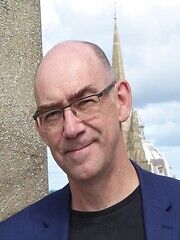
Peter Holland FRS is the 11th Linacre Professor of Zoology at the University of Oxford, UK. His research group studies how genome evolution relates to evolution of the animal kingdom, with a focus on mammals, moths and marine invertebrates. He is also part of the Darwin Tree of Life consortium aiming to sequence the genome of every species in the UK and has a long-term obsession with homeobox genes.
Susan MANGO, Prof. University of Basel, SWITZERLAND
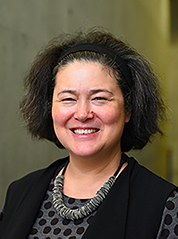
Susan Mango investigates the molecular underpinnings of embryonic development, with a particular focus on chromosome organization and transcription, RNA localization in epithelia and transgenerational inheritance of stress. She uses the power of C. elegans genetics, genomics and imaging for these studies.
Susan Mango trained at Harvard University for her undergraduate studies, where she worked with Boris Magasanik at MIT. She performed her graduate work at Princeton University with Dr. Michale Cole on the myc oncogene before switching to C. elegans for her postdoctoral work in the lab of Judith Kimble at the University of Wisconsin – Madison /HHMI. She started her first academic position at the Huntsman Cancer Institute at the University of Utah before moving to the Molecular and Cellular Biology Department at Harvard University. She relocated to the Biozentrum at the University of Basel in 2019. Dr. Mango has received multiple awards, including a John D. and Catherine T. MacArthur fellowship, an NIH MERIT award, an Excellence in Modern Scholarship Award, and she was recently elected to EMBO.
Patricia WITTKOPP, Prof. University of Michigan, USA

Patricia Wittkopp is Arthur F. Thurnau Professor and Sally L. Allen Collegiate Professor of Ecology and Evolutionary Biology as well as Molecular, Cellular, and Developmental Biology at the University of Michigan. Research in the Wittkopp lab uses fruit flies and baker's yeast to investigate the genetic and molecular mechanisms underlying phenotypic differences and examines the evolutionary processes by which they came to be. This includes differences among cell types, among individuals, and among species. The transcriptional regulation of gene expression is emphasized in this work because of its key role in converting genotypes into phenotypes. Molecular and developmental biology, population and quantitative genetics, genomics and bioinformatics are integrated in this work. Patricia Wittkopp received her B.S. from the University of Michigan, PhD from the University of Wisconsin, and performed postdoctoral research at Cornell University.
Jonathan RODENFELS, Dr. Max Planck Institute of Molecular Cell Biology and Genetics, GERMANY
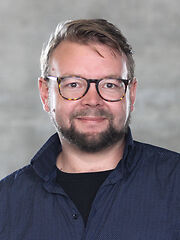
The research in the Rodenfels group focuses on understanding how flows of energy and cellular metabolism shape the behavior of out of equilibrium biological systems. We aim to quantify the overall energetics of living systems and understand how cells and organisms transform and partition their energy among the complex array of cellular processes that are necessary for life at any scale, from isolated biochemical networks to quiescent and highly proliferative cells to organismal growth and development. Jonathan did his biochemistry undergraduate at university of Bayreuth working on mitochondrial fusion and fission.
In 2008, he started his Ph.D. at the Max-Planck-Institute of Molecular Cell Biology and Genetics. He joined the lab of the late Suzanne Eaton studying the role of systemically circulating Hedgehog and steroid hormone signaling during fruit fly development. As a postdoc, Jonathan moved to New Haven joining the Neugebauer lab at Yale university. His research focused on establishing approaches to the quantitatively measure the flows of energy in biological systems, and to investigate the metabolism and energetics costs of development. Since 2021, Jonathan is a group leader at MPI-CBG working on the energetics of biological systems.
Alex SCHIER, Dr. University of Basel, SWITZERLAND
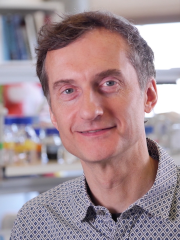
Alex Schier obtained his PhD from the Biozentrum in Basel, Switzerland, where he studied the transcriptional regulation of homeobox genes in Walter Gehring's lab. He spent his postdoc in Wolfgang Driever's lab in Boston, where he screened for and characterized mutants affecting zebrafish development. He started his lab in 1996 at the Skirball Institute of the New York University School of Medicine and joined Harvard University in 2005. In 2019 his lab moved to the Biozentrum at the University of Basel, Switzerland.
Schier has made pioneering contributions to vertebrate developmental genetics and to the establishment of zebrafish as a model system. Focusing on Nodal signaling, he and his lab demonstrated that Nodal signals can act as diffusive morphogens (the first in vivo identification of a vertebrate morphogen), found that Nodal and its feedback inhibitor Lefty constitute an agonist-antagonist pair as proposed by Turing, discovered One-eyed pinhead as a co-receptor that limits Nodal diffusion, and found that Vg1 is an obligatory partner of Nodal (solving a 30-year old mystery). Studying the maternal-zygotic transition (MZT), he discovered that the microRNA miR-430 initiates the deadenylation and degradation of hundreds of maternal mRNAs, making miR-430 a paradigm for microRNA function and launching renewed interest in the MZT. He discovered dozens of RNAs that encode small peptides, including Toddler, a signal that promotes gastrulation.
Schier also developed novel technologies to make zebrafish a powerful model system. He and his collaborators contributed to the establishment of DNA mutagenesis conditions and large-scale genetic screens, and performed the first positional cloning project. He established behavioral profiling and whole-brain imaging to analyze drugs and mutants, and developed zebrafish as a model for sleep research. Most recently, he and his collaborators pioneered methods for understanding development at global scales. Through genomic barcode editing technology and single-cell sequencing they reconstructed the lineage relationships and differentiation trajectories of thousands of cells. This research was featured as Science Breakthrough of the Year 2018.
Schier was a McKnight Scholar for Neuroscience, an Irma T. Hirschl Scholar, and an Established Investigator of the American Heart Association. He received a NIH MERIT award in 2016, a NIH Pioneer Award in 2017, and an ERC Advanced Grant in 2020. Schier was elected to EMBO in 2018, to the National Academy of Sciences and Academia Europaea in 2020, and to the American Association for the Advancement of Science in 2022, and received the George Streisinger Award of the International Zebrafish Society in 2020. He chaired the Department of Molecular and Cellular Biology at Harvard University from 2014-2017, and has served as Director of the Biozentrum Basel since 2018.
Schier's impact is also evidenced by the success of his many collaborators and his trainees. 16 of 20 graduate students in the Schier lab went on to postdoctoral research positions, and 32 of 37 postdocs started their own labs at leading institutions, including Yale, Princeton, Caltech, and University of Cambridge.
Gilles STORELLI,Dr. University of Cologne, GERMANY
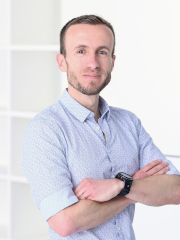
Dr. Storelli performed his graduate training under the mentorship of Dr. François Leulier, at the Institute for Functional Genomics Lyon (IGFL)/Ecole Normale Supérieure de Lyon, France. There, he studied nutritional mutualism between animal hosts and their intestinal bacteria. His work contributed to establishing Drosophila as a model for the study of host-microbiome interactions, and he received in 2016 the annual PhD thesis award from the French Society for Developmental Biology (SFBD).
Dr. Storelli then joined Prof. Carl Thummel’s lab at the University of Utah School of Medicine, USA, to study « metabo-devo » or the coordination of metabolism with development. He discovered that a switch in lipid utilization occurs shortly after metamorphosis to support the metabolic needs and nomadic lifestyle of adult Drosophila. His postdoctoral training was supported by a fellowship from the Foundation for Medical Research (FRM) and the Prize for Young Researchers from the Bettencourt-Schueller Foundation.
In 2020, Dr. Storelli obtained a research group leader position at CECAD/The University of Cologne, Germany. The Storelli lab studies intestinal physiology and host-microbiome interactions from a metabolic perspective. The group has recently been awarded a DFG research grant to investigate the contributions of lipid metabolism in inflammatory signaling and intestinal barrier function, as well as an ERC Starting Grant to study the metabolic crosstalk between animal hosts and their microbiome.
Emilia SANTOS,Dr. Cambridge University, UK
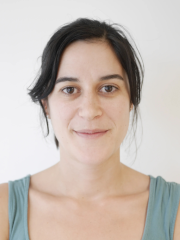
Emilia Santos is a NERC Independent Research Fellow and Assistant Professor at the Department of Zoology, University of Cambridge. Her research focuses on the emergence and diversification of morphological traits, more specifically she is interested in the genetic and developmental basis of variation in pigmentation patterns and neural crest cells using cichlid fishes as a model system. Her approach combines genomics, and cellular and developmental genetics, to bring a comprehensive understanding of the mechanistic basis underlying organismal diversification.
Chiara SINIGAGLIA, Dr. CNRS/Sorbonne University, FRANCE
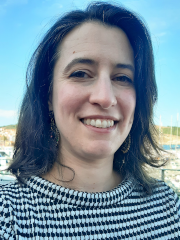
Chiara Sinigaglia has recently opened a research team at the marine station of Banyuls-sur-Mer (Sorbonne University/CNRS), focused on jellyfish regeneration and development. Originally from Italy, Chiara pursued her Bachelor and Master studies in Evolutionary Biology at the University of Padua, getting the first laboratory experiences on questions of ascidian evo-devo. She then moved to Norway for her PhD studies, where she joined the group of Fabian Rentzsch at the Sars Centre for Marine Molecular Biology (Bergen), investigating the links between body patterning and nervous system in the sea anemone Nematostella vectensis. During her first postdoc, she established the jellyfish Clytia hemisphaerica as a novel model for regeneration studies, while working in the lab of Evelyn Houliston and Tsuyoshi Momose at the Developmental Biology unit of Villefranche-sur-Mer (France). In 2017, she joined as a postdoc the team of Michalis Averof, at the Institute of Functional Genomics of Lyon (France), where she investigated limb regeneration in the crustacean Parhyale hawaiensis.
Lies CHIKHAOUI, Dr. IGFL, ENS-Lyon, FRANCE
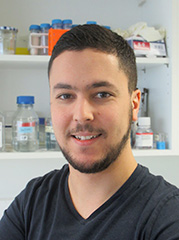 I studied at the University Claude Bernard in Lyon, France, where I trained for molecular and cellular biology. I then worked for a few months in a diagnostic company near Seattle before obtaining an FRM fellowship to prepare a PhD on the impact of circadian rhythms on the murine transcriptome, especially alternative splicing, in Kiran Padmanabhan's lab. I'm now doing a postDoc at the University of Lausanne studying the mechanisms of translation.
I studied at the University Claude Bernard in Lyon, France, where I trained for molecular and cellular biology. I then worked for a few months in a diagnostic company near Seattle before obtaining an FRM fellowship to prepare a PhD on the impact of circadian rhythms on the murine transcriptome, especially alternative splicing, in Kiran Padmanabhan's lab. I'm now doing a postDoc at the University of Lausanne studying the mechanisms of translation.
Julie CARNESECCHI, Dr. IGFL, ENS-Lyon, FRANCE
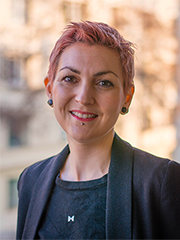 Julie Carnesecchi received her PhD in 2014 from the Institute of Functional Genomics of Lyon (IGFL), where she studied transcription and chromatin regulatory networks in breast cancer, in the lab of Jean-Marc Vanacker. She moved to Germany for her postdoc and joined the lab of Ingrid Lohmann at the Centre for Organismal Studies (COS, Heidelberg). Here, she investigated Hox regulatory networks during the embryonic development of Drosophila melanogaster. Notably, her work revealed that Hox transcription factors establish tissue-specific interactions with proteins regulating distinct layers of gene expression, from chromatin to mRNA processing. Subsequently, she uncovered a novel molecular function of Hox transcription factors in mRNA splicing. In 2021, she returned to Lyon as a CNRS researcher and continues to develop her research at the IGFL, hosted by the lab of Samir Merabet. Her research focuses on deciphering how transcription factors integrate transcription and mRNA processing regulatory networks to coordinate cell fate decisions.
Julie Carnesecchi received her PhD in 2014 from the Institute of Functional Genomics of Lyon (IGFL), where she studied transcription and chromatin regulatory networks in breast cancer, in the lab of Jean-Marc Vanacker. She moved to Germany for her postdoc and joined the lab of Ingrid Lohmann at the Centre for Organismal Studies (COS, Heidelberg). Here, she investigated Hox regulatory networks during the embryonic development of Drosophila melanogaster. Notably, her work revealed that Hox transcription factors establish tissue-specific interactions with proteins regulating distinct layers of gene expression, from chromatin to mRNA processing. Subsequently, she uncovered a novel molecular function of Hox transcription factors in mRNA splicing. In 2021, she returned to Lyon as a CNRS researcher and continues to develop her research at the IGFL, hosted by the lab of Samir Merabet. Her research focuses on deciphering how transcription factors integrate transcription and mRNA processing regulatory networks to coordinate cell fate decisions.
Cyril CHARLES, Ass. Prof. IGFL, ENS-Lyon, FRANCE
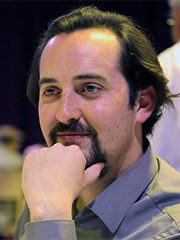 After a PhD at the Institute of Paleoprimatology and Human Paleontology of Poitiers (France) and a post-doc in developmental biology at the University of California, San Francisco (USA), Cyril Charles joined the Ecole Normale Supérieure de Lyon and the Institute of Functional Genomics of Lyon in 2010 as associate professor. He has been working on the evolution and development of Vertebrates with a special focus on teeth. He's studying how morphology can be modified in the course of embryonic development and individual life in order to better understand the genetic, environmental and developmental basis of evolutionary changes. His methods include developmental genetics, morphometrics, and informatic modeling. Originally working on rodents, his works and ongoing projects in the team of Nicolas Goudemand now also include other vertebrates such as lagomorphs or cichlids.
After a PhD at the Institute of Paleoprimatology and Human Paleontology of Poitiers (France) and a post-doc in developmental biology at the University of California, San Francisco (USA), Cyril Charles joined the Ecole Normale Supérieure de Lyon and the Institute of Functional Genomics of Lyon in 2010 as associate professor. He has been working on the evolution and development of Vertebrates with a special focus on teeth. He's studying how morphology can be modified in the course of embryonic development and individual life in order to better understand the genetic, environmental and developmental basis of evolutionary changes. His methods include developmental genetics, morphometrics, and informatic modeling. Originally working on rodents, his works and ongoing projects in the team of Nicolas Goudemand now also include other vertebrates such as lagomorphs or cichlids.
Nipam PATEL, Director of the Marine Biological Laboratory (MBL) and Prof. University of Chicago, USA
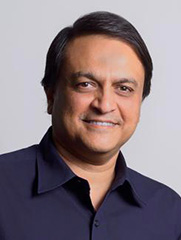 Nipam Patel, Ph.D., is Director of the Marine Biological Laboratory (MBL) and a Professor at the University of Chicago. He joined the MBL in 2018 from University of California, Berkeley, where he was Professor and Co-chair of the Department of Molecular and Cell Biology and Professor in the Department of Integrative Biology. Patel is the 20th scientist to serve as MBL Director since its founding in 1888.
Nipam Patel, Ph.D., is Director of the Marine Biological Laboratory (MBL) and a Professor at the University of Chicago. He joined the MBL in 2018 from University of California, Berkeley, where he was Professor and Co-chair of the Department of Molecular and Cell Biology and Professor in the Department of Integrative Biology. Patel is the 20th scientist to serve as MBL Director since its founding in 1888.
Patel grew up in El Paso, Texas, and received an A.B. in Biology from Princeton University and a Ph.D. in Biology from Stanford University. Prior to joining UC Berkeley in 2003, he was a professor of Organismal Biology and Anatomy at the University of Chicago (1995 to 2003), a Howard Hughes Medical Institute Investigator (1995 to 2010), and a Staff Associate in the Department of Embryology at the Carnegie Institution in Baltimore, Md. (1991 to 1995). A longtime member of the MBL community, Patel has taught in the MBL Embryology course since 2001 and served as course co-director from 2007 to 2011. He is a leading scholar in modern evolutionary and developmental biology with specific focus on the evolution of body patterning and segmentation, regeneration of the germline, and structural coloration. His scientific expertise encompasses the development of novel, genetic model organisms for biological study, which can reveal much about human biology; and the application of advanced imaging technologies to probe the fundamental dynamics of living systems.
Patel is an elected fellow of the American Association for the Advancement of Science and has been awarded numerous honors, including the Schubert Endowed Chair and the William V. Power Endowed Chair at UC Berkeley, the McKnight Scholars Neuroscience Fellowship Award, and an NSF Predoctoral Fellowship. Other past appointments include faculty curator at the Essig Museum of Entomology, UC Berkeley; and adjunct professor at the National Institute of Genetics in Shizuoka, Japan.
The author of more than 130 scientific publications, Patel was an editor of the journal Development (2009-2018) and serves on the editorial board of several other journals in the biological sciences. He has served on numerous advisory boards, including board of directors of the Society for Developmental Biology.

